The slum women of Kenya

Majority of women in Kenyan slums are the breadwinners. Life here is often dangerous, particularly for these women-headed households.
What you need to know:
- UN Women and UN-Habitat say Kenya is one of the 59 developing countries where women aged 15 to 49 are overrepresented in slums.
- Without a regular income, their access to clean water and proper sanitation is compromised, given that they have to buy water and pay to use a toilet.
- Regrettably, most of these women are unaware of the economic empowerment programs initiated by the government.
Slums have the most dilapidated living conditions. Poor sanitation and overcrowding are among the problems that bedevil these informal settlements. The shacks and buildings are mostly illegal and consequently, lack basic infrastructure services like water, sanitation and health facilities. Although the residents would prefer better homes, most can’t afford. The lack of basic services affects women disproportionately because they spend most of their unpaid work hours attending to their caregiving roles at home. Majority are the breadwinners. Life here is often dangerous, particularly the women-headed households.
UN Women and UN-Habitat say Kenya is one of the 59 developing countries where women aged 15 to 49 are overrepresented in slums. In Kibra, Nairobi, for instance, there are 116 women for every 100 men. The figure is higher in Gabon, Ghana, Guatemala, Haiti and Lesotho, where women are more by 20 per cent. Their socio-economic status is, nevertheless, lower than that of men and the Covid-19 crisis illuminated the disparities.
A 2021 study published in BMJ Open, a peer-reviewed open access medical journal, in which the researchers surveyed gendered economic, social and health effects of Covid-19 in Nairobi informal settlements, found women were six per cent more likely to skip a meal than men. And those who had completely lost their income were 15 per cent more likely to do so.
Similarly, women’s hours for unpaid care work increased. For instance, women spent 53 per cent of the time teaching children compared to 15 per cent for men.
Although the women take the roles of teachers at home, their level of education is low, a factor primarily contributing to their over-representation in low-paid and insecure jobs such as waitress, cleaning and domestic work.
Studies have found that unstable jobs or little profitable businesses, or lack of both, increase their vulnerabilities to sexual exploitation and domestic violence.
Without a regular income, their access to clean water and proper sanitation is compromised, given that they have to buy water and pay to use a toilet. Only a few of their low-quality houses have tap water while most don’t have latrines.
Additionally, accessing the toilets at night is risky. They have to walk through the dark narrow alleys littered with sewage and other forms of waste to reach the facilities located yards away. Regrettably, most of these women are unaware of the economic empowerment programs initiated by the government. This, therefore, begs the question: How aggressive is the government in creating awareness of their poverty alleviation initiatives?
The women shared their life journeys with us...
Cecilia Nelima, Eldoret
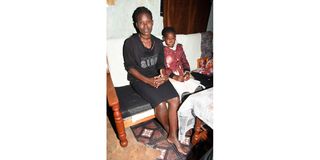
Cecilia Nelima, a single mother of three, with her youngest child , during the interview at her single room house at Kipkaren in Eldoret town last month.
For close to two decades, Cecilia Nelima has done menial jobs at a maize milling firm in Eldoret. Her work involves drying maize or picking grains based on demand.
The 35-year-old is a resident of Kipkaren Estate, a low-income residential area on the outskirts of the town.
Being the sole breadwinner, she knows only too well that she must work hard to provide for her family. Unfortunately, the firm only calls her when they need an extra hand.
On such days, she is up at 6am to get to work on time. She works until 5pm. This means she has no regular source of income and often has to supplement her income by washing people’s clothes at a small fee.
“I work for three days a week most of the time. Sometimes I work on weekends when called up for the odd jobs,” explains Ms Nelima.
The single mother of three, who resides in a single room, says life has been unbearable, observing that she struggles to raise fees for her children. Two are in secondary school (forms one and two) while the lastborn is in Grade Three.
More often than not, they have been turned away from school over school fee arrears. She says it has not been easy accessing bursaries to support her children despite her difficult financial situation.
“If in a day I earn Sh100, I spend Sh20 on meals and I save Sh80 because I must ensure my children go to school. Being a single mother is really tough since I have to bear all the responsibilities,” she says.
Ms Nelima also says she is unable to afford National Health Insurance Fund (NHIF), making it difficult to access healthcare.
“The nearest health facility is Pioneer Health Centre and to access treatment or medication requires money, which I cannot afford. One time my daughter was unwell and I just bought some medicine from a chemist and gave her hot water because I could not afford to take her to a health facility. Fortunately, she recovered,” she says.
Living in the area also poses a sanitation challenge. A 20-litre jerrycan of water goes for Sh5, and this can only last a day.
“We cannot afford proper diet or buy more water because of financial constraints,” she notes.
Ms Nelima is not very optimistic about her future.
“Only God knows about tomorrow. I am working hard to educate my children so that at least they are able to support me to improve my social-economic standards.”
Roselyn Juma, Kisumu
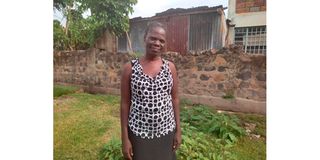
Roselyne Juma at her home in Nyalenda slums, Kisumu County, during the interview on January 21, 2022.
For Roselyn Juma, living in the slums is not something she ever admired.
She was forced to move out of her matrimonial home in Kasagam, Kisumu East, back in 2005, following land wrangles with her in-laws.
The death of her husband in 2005, resulted in frequent quarrels over the small piece of land he had left behind. She later moved to Nyalenda slums in search of a peaceful place for her young family.
At the time, she was a 23-year-old mother of four, the eldest aged six years and the youngest three months.
The widow says life in the slums has not been easy.
“Most women here live hand to mouth. We either hawk house provisions or engage in menial jobs, including washing clothes or acting as house servants,” says Ms Juma.
A number of times she also buys sardines, which she sells at a profit to cater for her small family. Two of her children are physically challenged and need extra care.
More often than not, they have had to skip some meals to meet other family needs. Worse still, the sanitation in the slum is wanting.
“Our pit latrines are often in a bad state, they fill up fast, forcing households to put up with the bad smell,” says Ms Juma.
The slum drainage system is also something she keeps hoping could change - the dirty, smelly water passing through their compounds is unbearable.
Ms Juma says reproductive health has been given little attention, especially among schoolgirls who often fall victim to sex pests and become pregnant.
She is, however, glad that through her hard work, she has been able to send all her children to school. The eldest sat her Kenya Certificate Secondary Education exam in 2020.
She got a loan from a women’s group to support her business.
“I now sell clothes, shoes and bags and use the income to settle a number of needs.”
She hopes to raise enough money to buy a parcel of land by the end of the year where she can settle with her children.
Amina Asha, Nairobi

Amina Asha at her home in Kibra, Nairobi, on January 13, 2022.
We find Amina Asha seated on her bed inside her poorly lit rental mud shack in Kibra slums, Nairobi County.
She has elbowed her left hand over her knee and palmed her chin. In her state, the grandmother is pondering over how to get food for her two grandchildren. The 49-year-old Asha, born and raised here, is currently without a source of income.
She dropped out of school in Grade Two and has never undergone any training to boost her chances of securing a job.
But she is a good cook of Swahili dishes, she says. Between March and June last year, she hawked Swahili snacks in Kibra but then the business fizzled out as she lost money in huge waste of unsold food.
In her house, there is only one chapati that she was given by a friend whom she had visited the previous day to scout for work.
That would be lunch for her four-year-old grandson. When the other grandson in Grade One returns from school in the evening, he’ll have nothing to eat unless ‘Prophet Elijah’ visits the grandmother. By sunset, her stomach too, would be growling.
Her husband died in 2010, leaving her with two children who now live elsewhere. She has been left with the responsibility of taking care of her daughter’s sons.
Before Covid-19, she would raise a monthly income of Sh10,000 from cooking and doing domestic work in the high-end homes in Hurlingham and Yaya Centre within the city. The pandemic, however, disrupted the economic chain, and such opportunities are now rare.
Her 20-litre jerrycan of water is three-quarters full. She says she will cautiously spend the water to last until the end of the following day.
Without Sh5, she’ll not have another 20-litre of water. Worse still, she requires Sh30 at any given time to cover toilet charges for her household. They go to a nearby toilet that charges Sh10 each round, for both children and adults, she says. Their compound has no toilet.
In the last quarter of 2021, she tried selling homemade liquid soap and bleach having learnt how to make them from a local community-based organisation.
“They were not selling, so I stopped. I’ll resume later this year when the business is good. At the moment, I do any job, whether its laundry task or cleaning job.”
But even getting those jobs require connections. Someone has to link her up, she says. She has been idle for the past week. Otherwise, she would have stretched her wage of Sh500 per job done for the day to cover at least seven days.
On the morning when we meet her, she had spent the only Sh20 she had to buy snacks for her grandchildren.
“I’m here sitting and waiting for someone to knock on my door with a job offer,” says Ms Asha, who, at the moment, has no phone.
Whoever needs her services has to reach her through her friend’s phone, send a word through other women or search for her in person.
And so, if she doesn’t get any job by the end of the day, Ms Asha and her grandchildren will not only have no food to eat, but will also not be able to use the toilet.
Should the waiting persist until the end of the day after the interview, then the situation will even be worse as they will have no water to quench their thirst.
Assuming nothing comes by in the next two weeks, she will be kicked out of the house for failing to pay Sh3,500 rent.
“I want a better life away from Kibra, but I don’t know how that will happen without a job,” she says.
Hadija Chebet, Nakuru
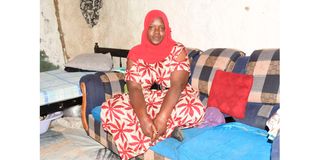
Hadija Chebet at her home in Bondeni slums in Nakuru City on January 21, 2021.
Three kilometres east of the Nakuru city centre is a three-bedroom semi-permanent house at Bondeni estate.
Here, we find Hadija Chebet, 33, relaxing after arriving from her Friday prayers in a Mosque, 200 metres from her home.
The mother of three, who is a tailor, has lived in Bondeni with her husband and their three children for the past 15 years.
Ms Chebet was born in a family of two was raised in Bondeni.
After completing her Kenya Certificate of Primary Education (KCPE) in 2003 at Bondeni Primary School, she didn’t proceed to secondary school as her mother could not afford school fees.
Ms Chebet instead enrolled herself for Madrasa classes a year later. Meanwhile, she could sometimes visit her aunt at her tailoring shop. during her free time. Her aunt would teach her how to sew. “I came from a humble background and saw my mum struggle to raise money for food, rent and cater for our basic needs. I had to sacrifice my education and step down for my younger sister to continue studying. With the help of my aunt, I learnt how to sew,” says Ms Chebet, who got married within Bondeni slums at the age of 19.
Her husband, a casual labourer, depended on manual jobs to cater for his young family. Fortunately, he was able to open a shop for Ms Chebet where she continued perfecting her sewing skills while earning some money.
Ms Chebet reveals that she earns at least Sh500 on a good day and Sh150 on a bad day.
“We opened a shop that I share with my two other friends. I help my husband cater for some bills with the little I earn, since we pay rent, buy food and pay school fees for our three children,” she says.
According to Ms Chebet, she leaves her two-and-half-year-old son with her mother, who also lives in Bondeni too, while her two other children go to school. She cannot afford a house help.
“Living in the slums is not easy, you have to brace yourself. This is where all kinds of crime, gender-based violence, defilement and rape occur,” says Ms Chebet
Her biggest challenge is when their taps run dry and she has to buy water from vendors at Sh30 for a 20-litre jerrycan.
Ms Chebet says they are lucky to have Bondeni Sub-County Hospital, which is 500 metres from her home. It is accessible for her family whenever they have a health issue.
Isha Mohammed, Nyeri
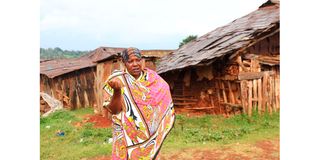
Isha Mohamed in Majengo slum, Nyeri town, on January 15, 2022.
Isha Mohammed has lived in Majengo slums, Nyeri County, for the past 52 years. She was born and raised in a two-room mud shanty, together with her three sisters.
“We lived with our mother who was the family’s sole breadwinner,” she says.
When her mother died, she inherited the house and became the breadwinner for not only her siblings but also her children, nephews and nieces. The house serves as the kitchen, living room and bedroom for the entire family.
Every morning, the single mother heads out in search of money for basic needs. She does manual work at a fee.
“I have to leave home early to find the homeowners before they leave for work,” she says in reference to the households where she does cleaning work.
Since she cannot afford a nanny or pay for day-care, she leaves the younger children with a neighbour while others go to school. She lives with her three children, a grandchild and her nephews and nieces.
Ms Mohammed says living in the slums is not easy since getting work is not guaranteed. She has to work extra hard to ensure her family survives.
“Sometimes you go out and come back with nothing; this has taught me to live in the present” she says.
Her adult children, nephews and nieces also leave the house every morning to look for work.
“They finished school and didn’t get jobs. We all go out to look for work in the hope that at least one of us will get something for the day.”
They have no tap water, so she has to buy the precious commodity from vendors.
“We buy water at Sh5 per jerrycan and use more than three every day. I also buy electricity tokens, books and stationery for the children,” she says.
Despite the doom and gloom, Ms Mohammed says she has learnt to enjoy life as it is. She has no savings, no bank account.
“What would I even put in there? I go out and earn Sh500; when you remove the expenses, you are left with nothing. When we have it, we eat three meals a day because our health is more important,” she says.
“I was lucky to get my children in hospital, which was good, but many women here are not. They give birth at home with the help of traditional birth attendants. That is very risky, especially when they have not consistently attended prenatal clinics.”
Ms Mohammed has learnt to cope with the challenges, saying life in Majengo has improved.
“We got our title deeds, we have access to roads, electricity and health services. More people are moving here, which means more work for us,” she says.
Immaculate Onyango, Mombasa
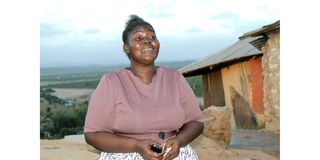
Immaculate Onyango during the interview on January 19, 2022 at Bangladesh slums in Mombasa. She champions the rights of widows in the slum.
When her husband died in a road accident in 2003, Immaculate Onyango was left on her own to provide for their only child. Her in-laws disinherited her, leaving her with nothing.
She began picking up the pieces by doing manual jobs, including fetching water for her neighbours. She sometimes had to beg for food.
Today, she is a champion in Bangladesh, the largest slum in Mombasa, helping fellow widows overcome their challenges.
However, slum life has dealt her a big blow due to daily challenges.
Bangladesh lacks fresh water and Ms Onyango, just like other residents, who are in excess of 20,000, depend on donations from a cement firm.
"By 4am, we line up to fetch the water that is ferried using water bowsers. Sanitation is also a challenge, we depend on the community health volunteers who sensitise us to hygienic practices," she reveals.
"I came to Mombasa in 1999, in search of a job to take me to college after completing my secondary education. I, however, fell in love with a man who gave me everything I needed. We lived as a couple for four years before he died. Life became difficult, especially when my in-laws turned their backs on me," narrates Ms Onyango.
“Being a widow in a slum is three times difficult. A widow has ‘no lawyer.’ You fight for yourself and in the slum, the situation is worse."
But in 2014, an NGO that empowers marginalised communities enrolled her and trained her on self-reliance.
Today Ms Onyango runs a shop in Bangladesh.
"I am where I am because of him (the NGO founder). There's a lot that happens in slums.”
She also sensitises slum women to family planning although religious and cultural beliefs have been a major hurdle.
Ms Onyango spends part of her day engaging women on how to overcome slum challenges. The high rate of teen pregnancy in the area disturbs her.
“My role in my community is to bring change and development. We must work hard to make ends meet," says Ms Onyango, who is also a Nyumba Kumi elder.
She had a shaking experience in 2014 when she was among five people arrested for use of Bangla Pesa. However, she says the arrest motivated her to work harder. Bangla Pesa or Sarafu was a community currency, which, though not backed by legal tender, residents used to meet their local development needs.
Given Ms Onyango’s advocacy work, many slum dwellers expect her to give them food, shelter, clothing and healthcare support but she has no means.
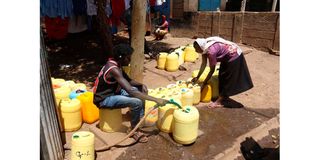
A woman buys water from a vendor in Kibra on January 13, 2022.
Eddah Wanjiku, Nairobi
Ms Wanjiku represents the struggles of millions of women who live in Kenyan slums. Going by the 2019 census, 10 million Kenyans live in the slums. For the past 22 years, she has lived in Mathare slums, Nairobi County.
After completing Form Four in 1999, she moved to the city to look for a job. For all the years, she has either worked as a cook, a domestic worker, or a hawker selling second-hand baby clothes and sweets.
Joblessness is the biggest challenge she has faced. Others include insecurity, poor housing and waste management, and inaccessibility to clean water and sanitary towels.
“I know how to cook a variety of local delicacies. I can work in hotels, but no one wants to employ me as I lack a certificate” says Ms Wanjiku, whose dream for further education was cut short by lack of financial resources.
“Often, when I say I can cook well, employers ask me for a certificate. I am now left to do jobs that earn me a daily income of less than Sh500.
“The jobs are also irregular so I switch to hawking when I have no bookings.”
Friends invite her to cook at weddings, family gatherings, or women’s meetings for pay. With two children now in high school and college, Ms Wanjiku is forced to take loans from table banking groups to pay their fees.
“I know of non-governmental organisations (NGOs) giving women in slums loans to boost their businesses, but I’ve yet to hear of the government doing so,” she says.
Last year, an NGO loaned her Sh10,000 to expand her clothing business. She struggled to repay over the three-month repayment period as the business was slow.
Her dream is to run a successful catering business.
“My hope is that one day, I’ll move out of Mathare. I’m optimistic that someday I will enroll for a catering course and start my own business.”
By Moraa Obiria, Stanley Kimuge, Winnie Atieno, Angeline Ochieng’, Regina Kinogu and Mercy Koskey




